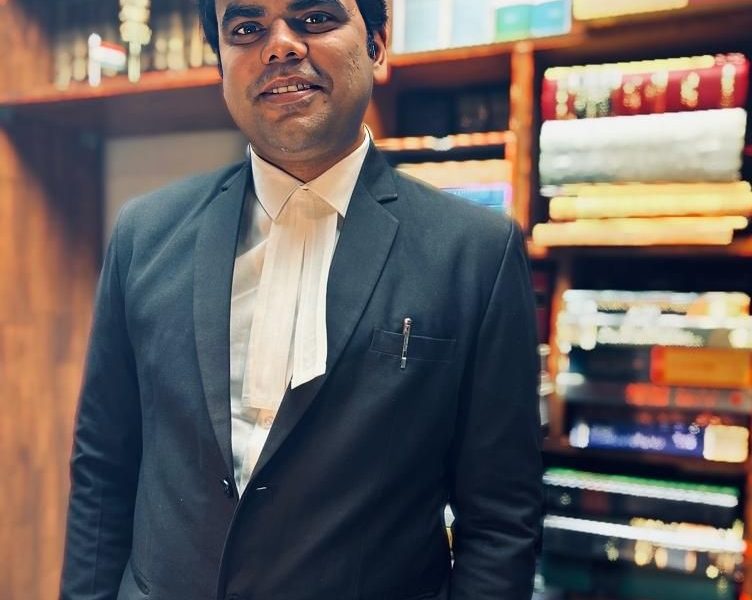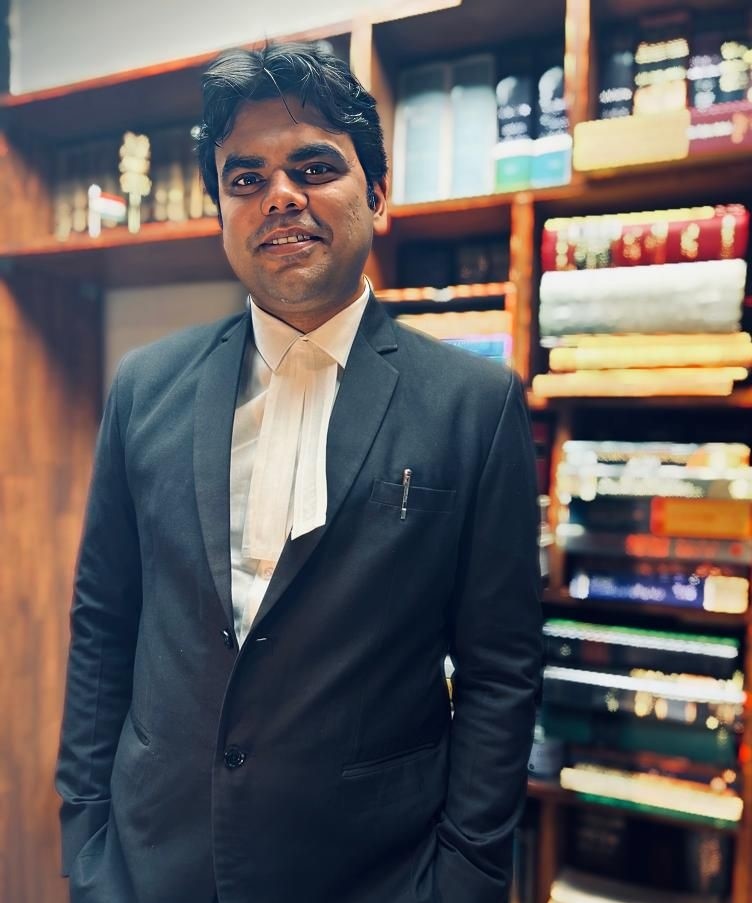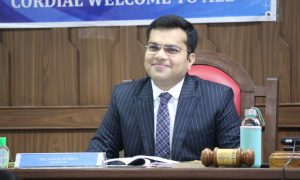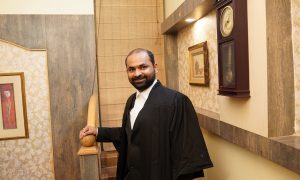This interview has been published by Priyanka Karwa and The SuperLawyer Team

Sir, could you please share with our readers how you ended up pursuing a career in law? What inspired you to choose this path?
My journey into the field of law was a combination of serendipity and destiny. After completing my 10th board exams, the only apparent option seemed to be pursuing a subject that would lead to engineering. However, fate had a different plan for me. During the summer vacation, I had the opportunity to witness a moot court competition organized by NLU Bhopal near the city auditorium. The atmosphere in the room was electric, as the final rounds were judged by esteemed judges from the Hon’ble Supreme Court and High Courts. The participants’ relentless efforts to unravel the epistemological intricacies of the law struck me. It was at that moment that I realized my true passion lay in the realm of law.
As a first-generation lawyer, what were some of the challenges you faced during your journey to becoming an Advocate on Record at the Hon’ble Supreme Court of India and the Hon’ble High Court of Delhi?
Regardless of whether you come from a long line of lawyers or you are the first in your family to enter the legal profession, the challenges faced by lawyers are often similar. Tenacity and a strong work ethic are crucial attributes that can never be replaced. However, as a first-generation lawyer, the need to work harder may be more pronounced, as you may not have the same network or familial guidance in navigating the legal landscape.
In my personal journey, I was fortunate to have friends and mentors who provided invaluable guidance and support at every step. As an alumnus of a prestigious National Law University (NLU), I had the advantage of knowing fellow lawyers practicing in various states across the country. Within a year or two of starting my independent practice, I began receiving work related to Hon’ble Supreme Court. It is worth mentioning that being an Advocate-on-Record (AOR) can significantly contribute to establishing oneself as a Supreme Court counsel.
Could you tell us more about your specialization in criminal law practice? What drew you to these particular areas of law?
I was always clear that to have a good litigation practice I need to start with the basics. With that in mind, I started my practice as a trial court advocate. The trial of Criminal law is very interesting. Every day you are representing someone whose dignity to life and property is at stake. Although all cases hold equal value, but in criminal matters, the exigencies are much higher. In trial court, the case revolves around hard facts and circumstances. It is in this spectrum of criminal jurisprudence the value of argumentative skills, research and legal strategy is put to real test.
With over nine years of experience in handling litigation at the Supreme Court and various courts and tribunals in Delhi, could you share some memorable cases or achievements that stand out in your career so far?
Throughout my nine-year career as a lawyer (which is relatively young), I have had the privilege of working on some captivating cases that have left a lasting impact on me. One particular case from my early years stands out, where I had the opportunity to represent a client who, as a woman, filed a domestic violence case against another woman. This presented an intriguing legal question: Could a woman file a domestic violence case against another woman? The courts in Delhi took notice of this matter and graciously decided to delve into the issue. Eventually, the High Court settled the matter, providing much-needed clarity on this aspect of the law. It was a significant moment, and I am grateful to have been a part of it, contributing to the understanding of domestic violence laws in such cases.
At present, I find myself involved in a matter before the esteemed Delhi High Court that necessitates the interpretation of Section 143A of the Negotiable Instruments Act. This specific issue revolves around whether directors should fall under the purview of this section. It is a thought-provoking legal debate, given the absence of clear precedents or extensive jurisprudence on this particular matter. The court’s forthcoming decision will not only provide guidance on this issue but will also contribute to the evolving body of law in this domain.
Additionally, I am currently engaged in another case where the Delhi High Court is carefully considering the scope and applicability of Sections 219 and 220 of the Criminal Procedure Code. The crux of the matter lies in determining whether multiple cases can be consolidated. This presents a captivating legal challenge, as it requires a meticulous interpretation of these provisions and an understanding of their practical implications. The court’s eventual ruling in this case has the potential to establish a noteworthy precedent and guide future proceedings involving the consolidation of cases
As a panel counsel for many PSU and MNC clients, what are the key responsibilities and challenges that come with representing such diverse clients?
Every client, regardless of their background or case, has similar expectations from their legal counsel. As an independent counsel in the legal service industry, it is essential to approach each case with honesty, dedication, and a genuine commitment to the work at hand. Maintaining a high level of professionalism and adhering to the client’s brief is paramount in providing quality legal services.
Being an independent advocate also comes with the challenge of staying updated with the evolving landscape of the law, particularly when dealing with a mixed practice. However, I am grateful for my colleagues with whom I share my practice, as they provide a valuable network for knowledge-sharing and staying abreast of legal developments. Additionally, my associates contribute to the endeavors of each day, collectively working towards providing the best possible legal assistance to our clients.
By fostering a culture of collaboration and continuous learning is necessary in current times. It is through this collective effort and dedication that I am able to navigate the complexities of the legal profession and meet the expectations placed upon by my clients. Further maintaining the highest standards of integrity, sincerity, and commitment in my practice is not only a professional obligation but also a privilege.
In your experience, what are the crucial factors that contribute to a successful settlement in litigation, especially when dealing with matters of recovery, contractual disputes, and consumer laws?
As I embarked on my legal career, I witnessed the increasing prominence of mediation and conciliation processes as essential components of the legal system. Recognizing the mounting burden on the judicial system, courts have established mediation centers within their premises, and certain statutes now mandate pre and post-litigation mediation. Embracing and respecting the process of mediation/conciliation has proven to be crucial in achieving successful settlements.
As an advocate, my role is to guide clients towards settlement options and set aside personal interests during mediation. By actively participating in the process and facilitating negotiations, we can strive for amicable resolutions. Embracing mediation not only avoids lengthy and costly court battles but also empowers clients to actively shape the outcomes of their disputes.
You have presided over a bench and been appointed as an arbitrator, Could you share any insights or lessons you’ve learned from these experiences?
I have had the privilege of serving as a legal member from the bar in the National Lok Adalat, where I presided over cases. Additionally, I have been appointed as an arbitrator by parties to resolve their disputes. The role of an arbitrator or presiding member differs from that of an advocate. In India’s adversarial system, the presiding person is expected to maintain a non-interventionist stance. This means that as an arbitrator, I am obligated to be non-partisan and impartial, basing decisions solely on the submissions made by the parties and the records presented. It is not my role to act as a devil’s advocate in search of equitable justice.
Maintaining neutrality as a non-partisan individual can be challenging, particularly given the overwhelming number of pending disputes that require resolution within a single day. However, it is important to remember that we are dealing with people and not just statistics. Striving for equanimity and impartiality is paramount, despite the difficulties. Each case before me represents real individuals and their concerns, and I always made sure that it is my duty to approach each matter with the utmost fairness and objectivity.
As a pro bono advocate, how does it feel to provide legal representation to underprivileged sections of society? Could you share a significant pro bono case that made a positive impact on your career or personal life?
As a panel counsel of DHCLS (Delhi High Court Legal Aid Service) and Delhi District Legal Aid, I have had the privilege of providing legal assistance to undertrial prisoners and underprivileged sections of society. In the pursuit of justice, it is essential to pay attention to the marginalized segments of Indian society, even amidst the economic growth the country is experiencing.
In the realm of criminal law practice, there is often a focus on representing clients involved in white-collar crimes, where the potential sentences are relatively low. However, there are many instances where young adults are falsely implicated in cases such as mobile phone robberies, which carry significantly higher sentences. It becomes challenging for these individuals to secure legal representation throughout the trial, which typically lasts 2-3 years. In such scenarios, the availability of free legal aid and pro bono services becomes crucial. Advocates should consider it their commitment beyond their profession to provide pro bono service.
During the COVID-19 pandemic, I had the opportunity to interact with an undertrial inmate in Tihar Jail. Despite having already served the maximum punishment of three years, the inmate was still languishing in jail due to delays in obtaining a release order caused by the limited functioning of the courts. Moved by the situation, I took immediate action and filed a bail application on a court holiday, presenting it before a duty magistrate. Through this effort, I was able to secure a release order on the same day, providing relief to the individual.
These experiences highlight the importance of dedicated legal aid services and the commitment of advocates to serve society. By extending our support to underprivileged individuals and fighting for their rights, we contribute to a more just and equitable legal system.
Finally, what advice would you like to give to fresh graduates who are aspiring to pursue a career in law? What qualities or skills should they focus on developing to succeed in this profession?
Law is an intriguing field that has been evolving alongside the changing times. It is important to recognize that there are numerous career options in law available after graduation, beyond traditional paths like litigation or corporate law practice.
For a litigating lawyer, certain skills are essential. Firstly, honesty is paramount. It must extend to the client and to the honorable court. Upholding honesty and integrity in all aspects of legal practice is crucial for maintaining the trust of clients and the integrity of the judicial process.
Secondly, perseverance and hard work are key. Contrary to the portrayal in John Grisham novels, the reality of a successful legal career necessitates ongoing dedication and consistent effort. One significant case does not negate the facet of continuous hard work. It is through sustained perseverance that an advocate can navigate the complexities of the legal profession and further it is important to recognize that success is not achieved overnight. It is a culmination of integrity, diligence, and an unwavering commitment to the ethos which you promised to yourself before entering the profession.
























